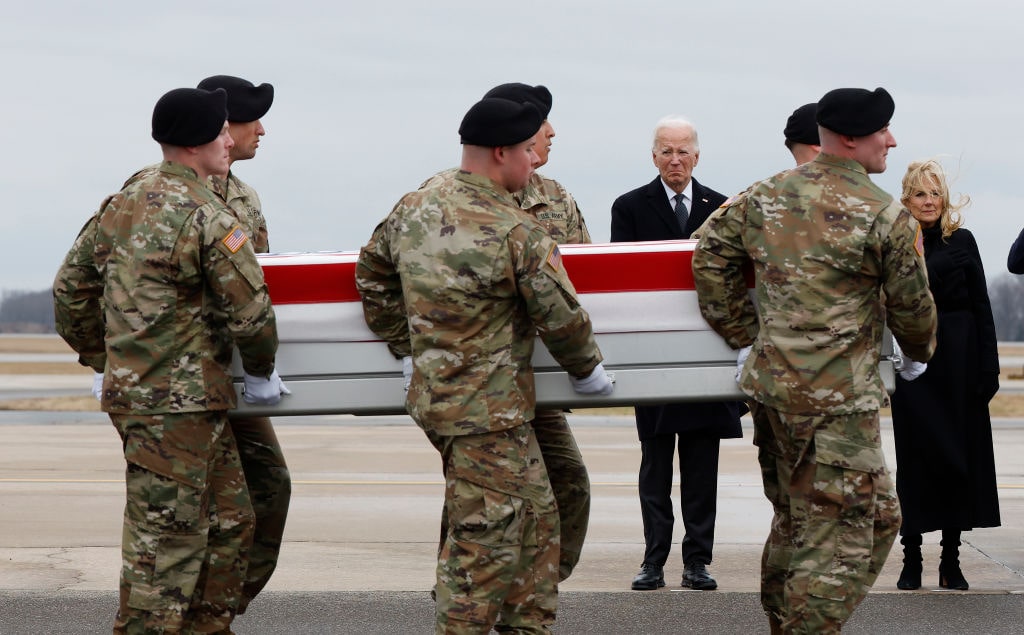The US began a series of air strikes from several platforms against targets in Syria and Iraq Friday afternoon. Early reports from the Pentagon reveal that the attacks on Iran-proxy forces would be “tiered” and continue over several days. The American response follows 166 attacks on US military outposts and bases and the deaths of three US soldiers. Unfortunately, as one report explained, the time the Biden administration has taken to execute these strikes has allowed the Iranian-sponsored fighters and advisors in the Islamic Revolutionary Guard Corps to leave the target areas and return to Iran or take refuge from US attacks.
No one was surprised when, on Sunday morning, January 28, an Iran-proxy militia, Islamic Resistance in Iraq, launched a drone attack on a US outpost in Jordan, killing US Army Reservists Sergeant William River, Specialist Kennedy Sanders, and Specialist Breonna Moffett. For almost a week, the Biden administration has waited, dithering over what to do about the Iran-backed attackers. As one commentator explained, striking back at Iran-sponsored militias was the worst-kept secret in Washington, DC.
Air Strikes Wait for Weather?
 National Security Council spokesman John Kirby told a press gathering that the attacks began on Friday, February 2, and not sooner, because of the weather. He explained that American officials were “waiting for the weather to cooperate,” and that Friday was “the best opportunity.” Immediately, one wonders why the American taxpayer spends billions for all-weather precision-guided weapons capability. Kirby also mentioned that the Iraqi government was given a heads-up the air strikes were on their way. How’s that for operations security?
National Security Council spokesman John Kirby told a press gathering that the attacks began on Friday, February 2, and not sooner, because of the weather. He explained that American officials were “waiting for the weather to cooperate,” and that Friday was “the best opportunity.” Immediately, one wonders why the American taxpayer spends billions for all-weather precision-guided weapons capability. Kirby also mentioned that the Iraqi government was given a heads-up the air strikes were on their way. How’s that for operations security?
The series of air strikes on seven locations, four in Syria and three in Iraq, came at 4:00 p.m. Eastern. In a post on X, US Central Command announced:
“[F]orces conducted air strikes in Iraq and Syria against Iran’s Islamic Revolutionary Guards Corps (IRGC) Quds Force and affiliated militia groups. US military forces struck more than 85 targets, with numerous aircraft to include long-range bombers flown from United States. The airstrikes employed more than 125 precision munitions. The facilities that were struck included command and control operations centers, intelligence centers, rockets, and missiles, and unmanned aerial vehicle storages, and logistics and munition supply chain facilities…”
Central Command is the unified warfighting command responsible for the Middle East. There is little doubt the locations struck by two B-1 Lancer long-range bombers flying from the US had been evaluated for weeks as potential targets. So, does anyone think Iran got a message to change its behavior? No. They’ve had a week to move all the rockets, missiles, and drones to other locations. Command and control operations centers can be dismantled, broken down, and moved. “I’m not impressed at all… It’s all based on decision-making in the White House. They took their time to make this decision. It’s a clear decision to make. We are not going to go after the state sponsor of terrorism and the regime which is Iran,” retired Lieutenant General Keith Kellogg told Fox News. “What the Iranians are saying to themselves is ‘Hey, they’re not coming after us…Americans are afraid of escalation. They are risk averse to escalation. They’ve got leadership and advisors that are averse to escalation.'” And Iran would be right.
More Retaliation Is on the Way
“US military forces today conducted strikes on seven facilities, which included more than 85 targets in Iraq and Syria, that Iran’s Islamic Revolutionary Guard Corps (IRGC) and affiliated militias use to attack US forces. This is the start of our response,” Secretary of Defense Lloyd Austin III stated in a Pentagon press release. “The President has directed additional actions to hold the IRGC and affiliated militias accountable for their attacks on US and Coalition Forces. These will unfold at times and places of our choosing.” The secretary did not fail to include a disclaimer that the US doesn’t “seek conflict in the Middle East or anywhere else,” making Kellogg’s point.

(Photo by Kevin Dietsch/Getty Images)
A statement from President Biden reiterated the reluctance to widen the Middle East conflict and concluded with, “But let all those who might seek to do us harm know this: If you harm an American, we will respond.” We just won’t respond right away. Despite providing the public with information that this retaliation campaign will be conducted over a period of time, the caveat is consistent that the US is not trying to expand the conflict started by the savage Hamas attack against innocent Israelis on October 7.
It seems the Biden administration believes if they repeat the “not wanting to escalate” phrase enough, people will believe it. But no one does, and no one will. With the Iran-sponsored Houthi terrorists still attacking commercial shipping in the Red Sea, Hezbollah in Lebanon firing missiles into northern Israel, and the persistent attacks by Iran-backed proxies against US facilities and personnel, America gets it. The conflict has escalated with or without the Biden White House’s agreement.
Senator Roger Wicker (R-MS) expressed a common congressional reaction to the US air strikes in Syria and Iraq. According to a Reuters report, he said: “These military strikes are welcome, but come far too late…[The] Biden administration congratulates itself for doing the bare minimum. Instead of giving the Ayatollah the bloody nose that he deserves, we continue to give him a slap on the wrist.” Though Biden’s national security team promises a campaign of air strikes, the real culprit, Iran, remains unscathed. If the White House hopes to end attacks on American military forces, retaliation will have to be more than a wrist slap.
The views expressed are those of the author and not of any other affiliation.




